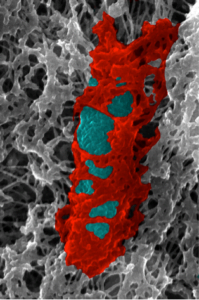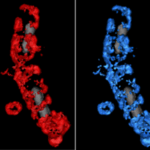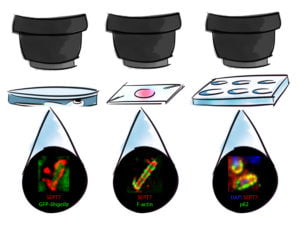The Lister Institute supports a variety of biomedical academics from several specialisms, helping boost the research community across the UK.
One increasingly important area of research, and one that has always been a part of the Lister’s heritage, is the study of infection. The growth of global resistance to antibiotics and the public health risks associated with ever more mobile populations are shining a spotlight on progress in this field – and on Lister Fellows such as Serge Mostowy.
Serge has recently taken up a new professorship at The London School of Hygiene & Tropical Medicine where he will further his research into the nature of infection. His laboratory studies the cell biology of infection and is observing how the cytoskeleton responds in order to control it.
The cytoskeleton is the name given to the interconnected network of filaments acting as structural determinants in a cell’s cytoplasm (the inside part of a cell excluding the nucleus). Serge’s team studies how the cytoskeleton reacts to infection primarily by analysing the bacteria Shigella which can invade the cell cytoplasm.
Shigella is highly infectious and can cause dysentery in humans. It is a leading cause of diarrhoea globally and has been designated by the World Health Organization (WHO) as one of the top 12 pathogens that pose a risk to human health, making new research into it of vital importance. By observing Shigella, Serge’s laboratory has also been able to find out more about how cells in general respond to bacterial infections, and this work has added to our understanding of fundamental immunity.
The Lister Institute has been pleased to support this work through a Prize Fellowship, and the funding flexibility has helped to facilitate some of Serge’s research processes which would not otherwise be possible.
Shigella is a Schedule 5 pathogen in the UK, making it extremely difficult to investigate. Researchers are not allowed to transport the pathogen between facilities for imaging, which is critical for in-depth analysis of the infection process. Funding from the Lister Institute enabled the purchase of a high resolution microscope specifically for the purposes of imaging Shigella in a secure and regulated environment. This line of investigation has directly helped to uncover the new cytoskeleton responses to Shigella infection that are showing such promise.



The host’s actin cytoskeleton is exploited by Shigella flexneri for dissemination within and between cells. Serge’s team discovered that infected host cells can prevent Shigella actin-based motility by compartmentalising bacteria inside “septin cages” for targeting to autophagy, an intracellular degradation process. A more comprehensive understanding of septins, a poorly characterised component of the cytoskeleton, should help in better understanding bacterial pathophysiology and its control.
Serge and his team are now also taking these findings further by working to apply his discoveries towards translational therapy. They are one of the few laboratories studying immunity to such bacterial infections in live animals using the zebrafish, with the long-term goal of developing new treatment options suitable for clinical trials. This work is also supported by a Wellcome Trust Senior Fellowship and a European Research Council (ERC) Consolidator Grant, further recognition of the importance of this research area.
The Lister Institute has also helped Serge’s work through access to mentorship and networking opportunities with our extensive network of Fellows and Members. Serge has explained that the ability to connect with and discuss his research with highly experienced experts has helped to push forwards his work – building towards the overall goal of achieving fundamental discovery and increased therapeutic impact. As he explains:
“Recognition from the Lister Institute is a special opportunity to develop a career path with impact. Their support enabled my lab to take advantage of the Shigella infection models we developed.”
We’re proud to be associated with scientists as accomplished as Serge Mostowy and his team, and we look forward to hearing more about his work in the future.



